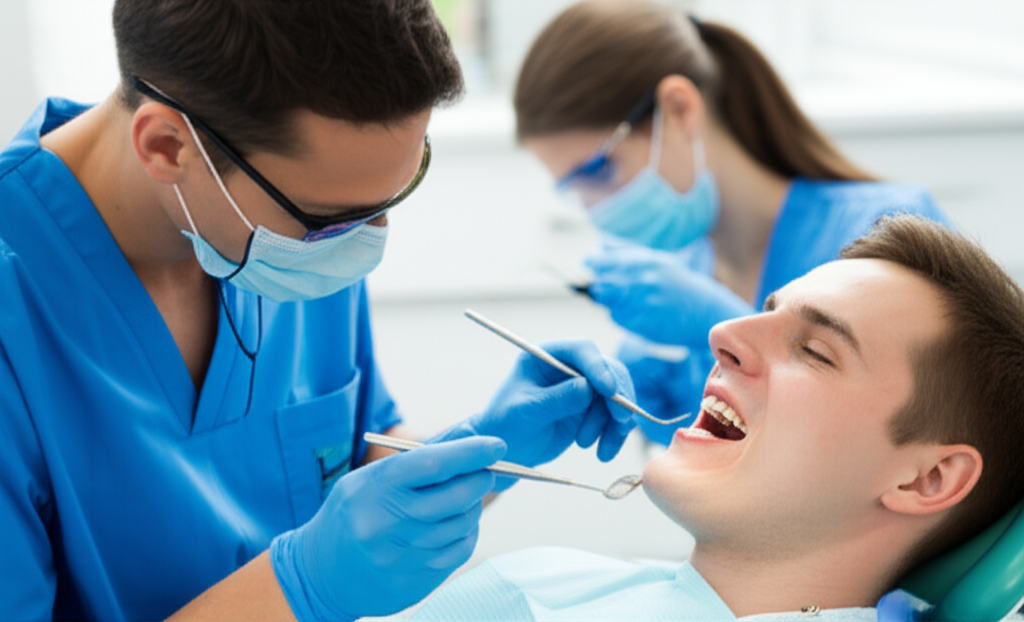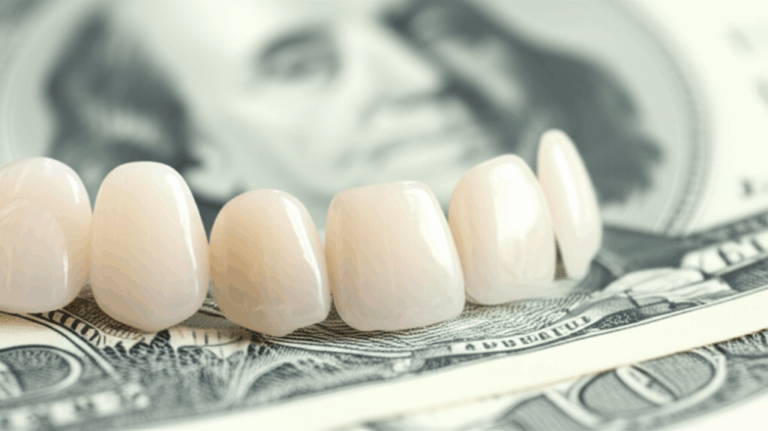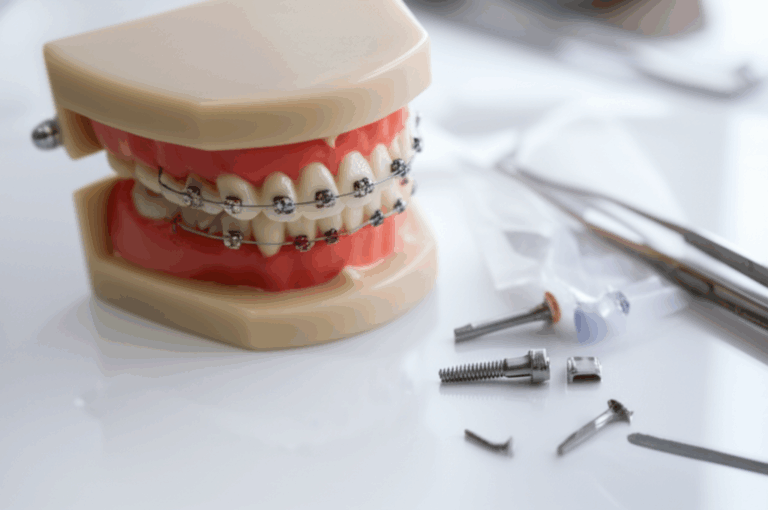
Dentist vs. Dental Hygienist: Understanding the Key Differences
Table of Contents
- Education and Training
- Core Responsibilities and Scope of Practice
- Pathways and Required Education
- Day-to-Day Duties and Limitations
1. Introduction: My Early Encounters with the Dental Team
When I first started going to the dentist as a kid, honestly—I didn’t know who was who. There was the person who cleaned my teeth and talked to me about brushing, and then there was someone else who checked for cavities and said what happened next. Much later, after spending time with both, I finally understood what each job was about and how different their training and work really are.
If you’ve ever thought “what’s the difference between a dentist and a dental hygienist,” you’re not the only one. Both work together in the office, but in very different ways. Knowing what they each do can help, whether you want to keep your teeth healthy or are thinking about working in the field. Here’s what I’ve learned—both from personal experience and from professionals—about what makes these two important dental jobs different.
2. What Is a Dentist? (DDS/DMD)
Education and Training
Becoming a dentist takes a long time and lots of hard work. From what I saw helping students get ready for dental school, it usually goes like this:
- Undergraduate Degree: Most dentists go to college for at least 4 years, usually taking lots of science classes.
- Dental School: Here’s where it gets tough—another 4 years, with classes in anatomy, medicine, lab work, and real-life training.
- Degrees: Graduates get either a Doctor of Dental Surgery (DDS) or Doctor of Dental Medicine (DMD). Just different names—the degrees are the same.
- Exams and Licensure: They have to pass big tests: the National Board Dental Exam and a state clinical test. You can’t practice until you pass both.
A lot of dentists go even further, training more in areas like braces, gum disease, or surgery. Some of the best dentists I’ve met spent extra years getting good at these things.
Core Responsibilities and Scope of Practice
Dentists are like the team leaders for your teeth. Here’s what they do:
- Diagnosis and Treatment Planning: Dentists figure out if you have gum disease, cavities, even mouth cancer. Kind of like detectives, they look at everything—X-rays, exams—to find problems.
- Restorative and Surgical Procedures: This is what people picture—fixing cavities, putting in crowns, pulling teeth, or doing root canals.
- Advanced Treatments: Things like implants, braces, and making your teeth look nice.
- Prescriptions and Medications: Only dentists can give you medicine or numbing shots for pain.
- Supervision: Dentists are in charge of the whole dental team, making sure everything runs safely and smoothly.
One of my mentors used to say, “A dental hygienist keeps your teeth healthy, but a dentist is there when something goes wrong.” That always stuck with me.
Real-World Example
When I watched Dr. Lee (a very good dentist), she found early gum disease in a patient who didn’t even know anything was wrong. She made a plan that included work by the hygienist and a visit to a gum specialist. This showed me how much a dentist’s training matters.
3. What Is a Dental Hygienist? (RDH)
Pathways and Required Education
Dental hygienists, sometimes called RDHs, become experts in their own way. After volunteering at a hygiene school clinic, here’s what I saw:
- Degree: Most hygienists go to school for two years for an associate’s degree, though some go four years for a bachelor’s. The schools are approved by CODA.
- Curriculum: The classes focus on teeth and gums, cleaning, and using dental tools—with plenty of practice on real people.
- Licensure: After school, they have to pass the National Board Dental Hygiene Exam and a state test. It’s tough, but needed to work as an RDH.
Hygienists are super skilled. I’ve seen how careful and focused they are with every patient.
Day-to-Day Duties and Limitations
If you’ve had your teeth cleaned, you’ve met a hygienist. Their main job is stopping problems before they start:
- Preventive Care: Hygienists clean teeth to get rid of plaque and tartar, using both small tools and fancy machines.
- Deep Cleanings: If someone has gum problems, hygienists clean below the gums.
- Diagnostic Support: They take X-rays, check your mouth for signs of cancer, and look at the health of your gums, then pass on what they find to the dentist.
- Patient Education: This is where hygienists really do great—teaching people how to brush, floss, and eat right so their teeth stay strong.
- Applied Treatments: They put on fluoride, sealants, and sometimes give shots (depending on where they work).
- Record-Keeping: Hygienists write down what they find and keep track of how you’re doing.
But, they can’t diagnose disease, fix teeth, or give out medicine. The law says only the dentist can do those things, but what hygienists do is still really important.
Personal Anecdote
One time at a community dental clinic, I saw a hygienist named Sarah show a little boy how to brush his teeth. She used a big toothbrush and plastic teeth, and by the end, the boy actually wanted to brush. That showed me how much a little bit of good teaching matters.
4. Dentist vs. Dental Hygienist: Main Differences at a Glance
Here’s a simple table I made for friends thinking about working in dental care:
| Dentist | Dental Hygienist | |
|---|---|---|
| Degree Required | DDS or DMD (Doctorate, ~8 years total) | Associate’s or bachelor’s (2-4 years) |
| Licensure | State and national boards, more testing | State and national boards |
| Primary Role | Finds problems, fixes teeth, leads team | Stops problems, teaches, supports |
| Procedures | Fillings, pulling teeth, root canals, crowns | Cleanings, deep cleanings, X-rays, sealants |
| Prescriptive Authority | Yes | No |
| Independent Practice | Yes | Usually needs a dentist’s supervision |
| Salary (Median – US, 2022) | ~$163,220 | ~$87,530 |
| Job Growth (2022-32) | 4% | 7% |
Rules and what each job does can be a bit different depending where you live. With new tools, sometimes both jobs work with digital dental labs or other technology.
5. Collaboration in Action: How Dentists and Hygienists Work Together
From what I’ve seen, good teamwork is a must in every dental office. Here’s usually what happens:
- First Point of Contact: When you sit in the chair, the hygienist says hello first. They look over your medical history, take X-rays, and start cleaning.
- Assessment and Communication: The hygienist tells the dentist what they found. The dentist checks your mouth and decides what needs to be done, if anything.
- Patient Education: Hygienists talk about home care and brushing, dentists talk about any bigger things like fillings or crowns.
- Ongoing Collaboration: The whole team, including dental assistants and sometimes a crown and bridge dental lab, work together to make sure care goes smoothly.
Some offices also work with a china dental lab for special jobs. Sharing the work like this means patients get better and faster results.
For you, this teamwork means faster visits and better care. Like, if a hygienist sees early gum trouble, they tell the dentist, and you can sometimes skip bigger problems (and bigger bills) later.
6. Career Paths and Job Outlook: My Personal Observations
I’ve talked to people in both jobs who really like their work, but their careers can look very different.
For Dentists
They have a lot of options:
- Private Practice: Many dentists want to own their own office, which is great but also a lot of responsibility.
- Group Practices: Working alongside other dentists or dental specialists, like a team.
- Specialization: After more school, dentists can become experts in areas like braces, oral surgery, or kids’ teeth.
- Academia and Research: Teaching students or working on new dental ideas and treatments.
- Public Health: Helping in places where people might not get dental care otherwise.
Dentists get paid more but may also have bigger student loans and sometimes more stress from running a business.
For Dental Hygienists
Hygienists can:
- General Practice: Work in regular offices, seeing lots of different patients. Steady work, lots of face-to-face time.
- Public Health and Community Programs: Work in schools or for government clinics, helping more people.
- Corporate or Educational Roles: Teach future hygienists or work for dental companies.
- Greater Flexibility: Many work part-time or in more than one office—helpful for families.
Both jobs are growing, with more need for hygienists right now. The Bureau of Labor Statistics says both are pretty steady and safe jobs.
7. Choosing Your Dental Career: Lessons from Real-Life Choices
If you’re torn about which way to go, here are some things I learned—plus advice from people working in both fields:
- Think About What You Like:
If you want to fix things and figure out tough problems, and you’re okay with lots of school, dentist might be right for you.
If you enjoy helping people keep their teeth clean and want to have time for other things, dental hygiene could be a great fit.
- School and Money:
Dentists go to school much longer and usually end up with more student loans. Hygiene school is shorter, with less debt.
- Pay and Balance:
Dentists earn more, but usually work longer hours and have more pressure. Hygienists aren’t paid as much but often have better hours and less job stress.
- Moving Up:
Both jobs let you keep learning. Hygienists can teach or work in sales, while dentists can open more offices or become specialists.
Ask yourself: do you want to be the person making the big plan, or the coach helping people keep their mouths healthy every day? Both jobs are rewarding—you just have to find what fits best for you.
8. Frequently Asked Questions
Can dental hygienists do fillings or pull teeth?
No. In the United States, only dentists can do fillings, pull teeth, or fix teeth with tools. Hygienists clean and teach, though some places let them do a little more with special training.
Is being a dental hygienist a step to being a dentist?
Some start as hygienists and then go to dental school, but it’s not really a direct path. They’re separate jobs, but hands-on work helps if you decide to switch.
What is the work-life balance like?
From what I’ve seen, hygienists often have more time for life outside work, while dentists have more to manage. Both can be busy, but people in both jobs seem to enjoy it.
Can you specialize?
Dentists can become specialists (like working with braces, gums, or tooth replacements). Hygienists might work more with gum health or in the community, but real special training happens for dentists.
Do they send work to dental labs?
Yes. Dentists often work with removable denture labs and others for things like crowns, dentures, or night guards. Hygienists help by taking molds, but don’t make the final products themselves.
9. Conclusion: The Importance of Both Roles on Your Oral Health Journey
Here’s what I learned watching dental teams: Preventive care and fixing problems are two halves of good dental care. The best offices are where dentists and hygienists respect each other and work well together, all for your smile.
If you’re getting ready for a career, wanting to know more about what happens at the dentist, or just care about your teeth, I hope this helps make things clear. Both jobs matter a lot—often working right next to each other—so everyone can have healthy, confident smiles.
And just remember, every great dental visit is a team effort. If you have questions, ask at your next check-up. Both your dentist and hygienist will be happy to answer.








